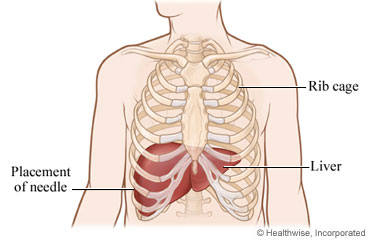
What is a needle biopsy of the liver?
A needle biopsy of the liver is a procedure to take a very small sample of your liver tissue. Then a doctor looks at this tissue under a microscope. He or she checks it for infection or other liver problems. This procedure is also called a percutaneous (say "per-kew-TAY-nee-us") procedure.
You will get medicine to help you relax. You will also get a shot of numbing medicine in the biopsy area. Then the doctor puts a long needle through your skin between two of your lower ribs on your right side. The needle goes into your liver to take the tissue sample. The doctor may use X-ray pictures on a screen to help guide the needle into the liver. When the needle goes into the liver, you may feel a pain in your shoulder. This is called referred pain. It's caused by pain that travels along a nerve near the biopsy area. After the doctor gets the sample, he or she removes the needle and puts a bandage on the spot where the needle went in. The procedure takes 15 to 20 minutes. But the needle is in your liver for just a few seconds.
After the procedure, you will need to lie on your right side for an hour or two. This can help stop bleeding in the part of your liver where the biopsy was done.
You will probably go home the same day. It can take several days to get the results of the biopsy. Your doctor will discuss the results with you.
How do you prepare for the procedure?
Procedures can be stressful. This information will help you understand what you can expect. And it will help you safely prepare for your procedure.
Preparing for the procedure
-
Be sure you have someone to take you home. Anesthesia and pain medicine will make it unsafe for you to drive or get home on your own.
-
Follow the instructions exactly about when to stop eating and drinking. If you don't, your procedure may be canceled. If your doctor told you to take your medicines on the day of the procedure, take them with only a sip of water.
-
Understand exactly what procedure is planned, along with the risks, benefits, and other options.
-
Tell your doctor ALL the medicines, vitamins, supplements, and herbal remedies you take. Some may increase the risk of problems during your procedure. Your doctor will tell you if you should stop taking any of them before the procedure and how soon to do it.
-
If you take a medicine that prevents blood clots, your doctor may tell you to stop taking it before your procedure. Or your doctor may tell you to keep taking it. (These medicines include aspirin and other blood thinners.) Make sure that you understand exactly what your doctor wants you to do.
-
Make sure your doctor and the hospital have a copy of your advance directive. If you don't have one, you may want to prepare one. It lets others know your health care wishes. It's a good thing to have before any type of surgery or procedure.
What happens on the day of the procedure?
-
Follow the instructions exactly about when to stop eating and drinking. If you don't, your procedure may be canceled. If your doctor told you to take your medicines on the day of the procedure, take them with only a sip of water.
-
Take a bath or shower before you come in for your procedure. Do not apply lotions, perfumes, deodorants, or nail polish.
-
Take off all jewelry and piercings. And take out contact lenses, if you wear them.
At the hospital or surgery center
-
Bring a picture ID.
-
You will be kept comfortable and safe by your anesthesia provider. You may get medicine that relaxes you or puts you in a light sleep. The area being worked on will be numb.
-
The procedure will take about 15 to 20 minutes.
When should you call your doctor?
- You have questions or concerns.
- You don't understand how to prepare for your procedure.
- You become ill before the procedure (such as fever, flu, or a cold).
- You need to reschedule or have changed your mind about having the procedure.
Where can you learn more?
Go to http://www.healthwise.net/patientEd
Enter U961 in the search box to learn more about "Needle Biopsy of the Liver: Before Your Procedure".
Current as of: July 31, 2024
Author: Ignite Healthwise, LLC Staff
Clinical Review Board
All Healthwise education is reviewed by a team that includes physicians, nurses, advanced practitioners, registered dieticians, and other healthcare professionals.

